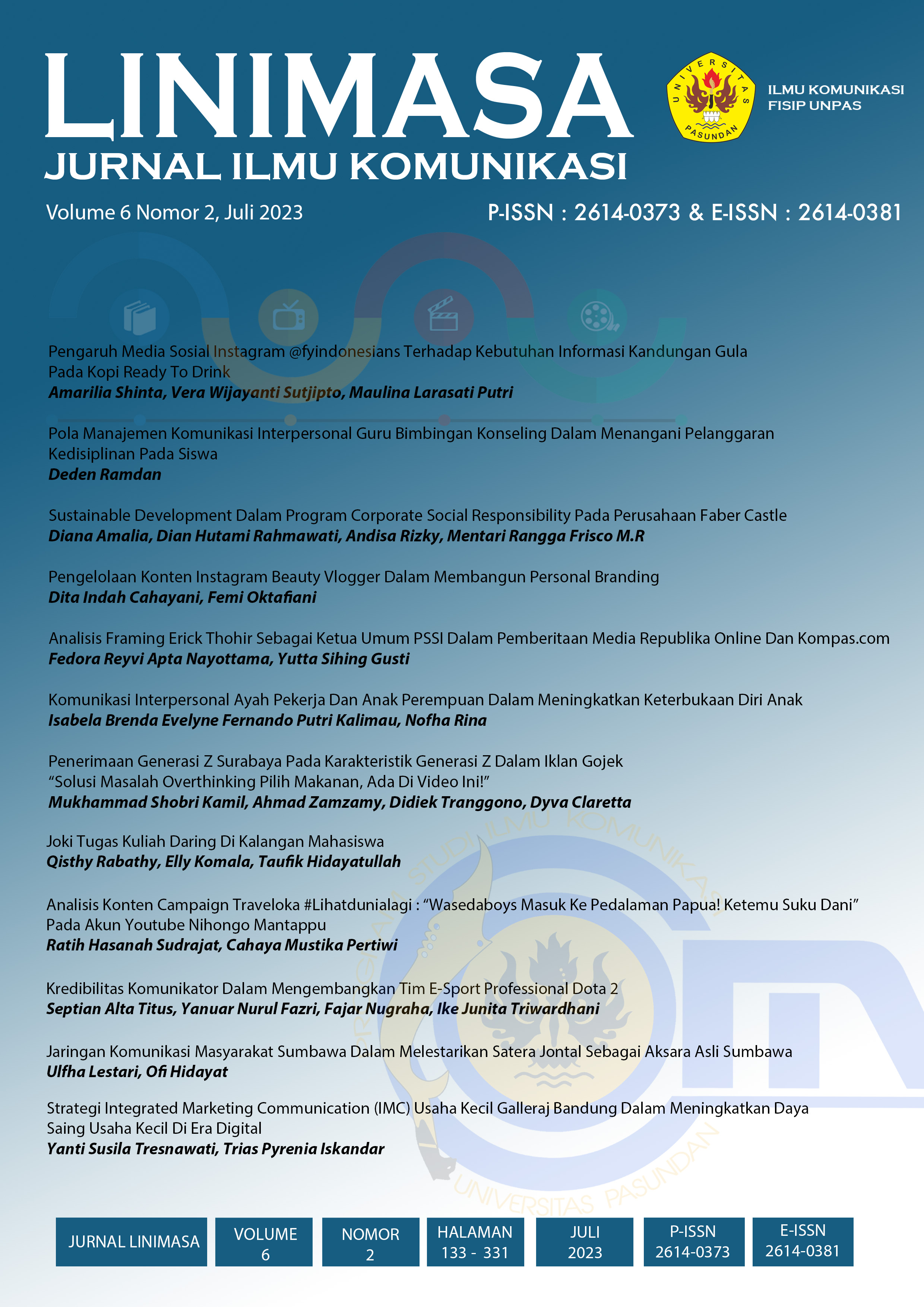JOKI TUGAS KULIAH DARING DI KALANGAN MAHASISWA
DOI:
https://doi.org/10.23969/linimasa.v6i2.7773Abstract
The implementation of online lectures due to the Covid-19 pandemic has created various problems for students, such as using lecture assignment jockey services among students to help complete assignments because there are many assignments with short deadlines. The rapid development of information and communication technology has made it easier for jockeys to offer their services, especially through social media applications. This research was conducted to determine the motives, actions, and meaning of the students who became task jockeys. The study was conducted using a phenomenological approach with a descriptive qualitative method. The results of this study indicate that in the concept of motive, first, the reason behind jockeying online lecture assignments among students is the motive of helping, gaining a material benefit, and filling in spare time activities. Second, the motive is to obtain non-material benefits to improve and develop skills, abilities, and knowledge. The act of assignment jockey is carried out by waiting for other people based on friend recommendations, asking friends who have been assisted in recommending their services to others, and promoting their services openly through social media. Meanwhile, in a meaning, students who become jockeys for online lecture assignments are activities to help others in doing their coursework which was originally motivated by the aim of providing assistance, which then received material rewards, as well as a way for them to improve their abilities and skills, especially in the academic field.
Downloads
References
Arikunto, S. 2006. Prosedur Penelitian: Suatu Pengantar Praktik. Jakarta: Rineka Cipta.
Barnlund, C. Dean. 1968. Interpersonal Communication. Boston: Houghton Mifflin.
Cangara, Hafied. 2006. Pengantar Ilmu Komunikasi. Jakarta: PT. Raja Grafindo Persada.
DeVito, Joseph A. 1987. Interpersonal Communication Book. New York: Harper & Row.
Effendy, Onong Uchjana. 1986a. Dimensi-dimensi Komunikasi. Bandung: Remaja Rosdakarya.
Effendy, Onong Uchjana. 1986b. Dinamika Komunikasi. Bandung: Remaja Rosdakarya
Effendy, Onong Uchjana.1988. Hubungan Insan. Bandung: Remaja Rosdakarya.
Effendy, Onong Uchjana. 1993. Ilmu, Teori dan Filsafat Komunikasi. Bandung: Citra Aditya Bhakti.
Effendy, Onong Uchjana. 2003. Ilmu Komunikasi Teori dan Praktek. Bandung: Remaja Rosdakarya.
Goede, W. J. 1988. Keluarga. Terjemahan Moasod Abdul Roshid. Kuala Lumpur: Dewan Bahasa & Pustaka.
Gunarsa, S.D. dan Gunarsa, Y.S.D. 2004. Psikologi Praktis Anak, Remaja dan Keluarga. Cet. 7. Jakarta: PT. BPK Gunung Mulia.
Hurlock. 1974. Personality Development. New Delhi: Mc.Grow-Hill Book Company Inc.
Khairuddin, H. 1985. Sosiologi Keluarga. Yogyakarya: Nur Cahaya.
Koentjaraningrat. 1981. Beberapa Pokok Antropologi Sosial. Jakarta: Dian Rakyat.
Liliweri, Alo. 1997. Komunikasi Antar Pribadi. Bandung: Citra Aditya Bhakti.
Little John, Stephen W. 1978. Theories of Human Communication. Ohio: Charles E. Merrill, Publishing Company.
Margono. 2004. Metodologi Penelitian Pendidikan. Jakarta: Rineka Cipta.
Moleong, J. Lexy. 2009. Metode Penelitian Kualitatif. Bandung: Remaja Rosdakarya.
Mulyana, Deddy. 2011. Ilmu Komunikasi Suatu Pengantar. Bandung: PT. Remaja Rosdakarya.
Nugroho, S.S. 2007. Hubungan Antara Persepsi Terhadap Komunikasi Keluarga Dengan Konflik Peran Ibu Bekerja di RS. Panti Wilasa “Citarum” Semarang. Skripsi Universitas Diponegoro.
Pertiwi, Sarri. 2006. Hubungan Antara Harga Diri dan Efektivitas Komunikasi Suami Istri dengan Kecemasan Suami yang Istrinya Berpengahasilan Lebih Tinggi. Skripsi tidak diterbitkan.
Rahmat, Jalaludin. 1991. Psikologi Komunikasi, Edisi Revisi. Bandung: Remaja Rosdakarya.
Soekanto, Soerjono. 2004. Sosiologi Keluarga. Jakarta: Rineka Cipta. Sugiono. 2001. Statistika Untuk Penelitian. Bandung: Alfabeta.
Soekanto, Soerjono. 2010. Metode Penelitian Kuantitatif, Kualitatif dan R&D. Bandung: Ikatan Penerbit Indonesia (IKAPI).
Susanto, Astrid S. 1984. Sosiologi Pembangunan. Jakarta: Bina Cipta.
Taylor, Anita at al. 1977. Communicating. Canada: Prentice-Hall, International Inc.
Verderber, Kathleen S., Verderber Rudolf F. 1986. Inter Act Using Interpersonal Communication Skill. Belmont, California: Wodsworth Publishing Company.
Widjaja, A. W. 2000. Ilmu Komunikasi dan Pengantar Studi. Jakarta: Rineka Cipta.















